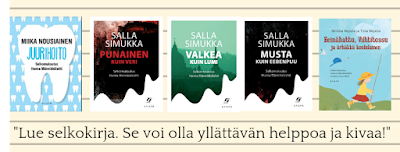- hiki
- kyynelneste
- lapsivesi
- lima
- mahaneste
- mätä
- oksennus
- räkä
- siemenneste
- sperma
- sylki
- uloste (kakka)
- vaikku
- veri
- visva
- virtsa (pissa)
- hiki - sweat
- kyynelneste - tears
- lapsivesi - amniotic fluid
- lima - slime
- mahaneste - gastric acid
- mätä - pus
- oksennus - vomit
- räkä - snot, nasal mucus
- siemenneste - semen
- sperma - sperm
- sylki - saliva
- uloste (kakka) - excrement, stool, poop
- vaikku - earwax
- veri - blood
- visva - pus
- virtsa (pissa) - urine, pee
Other fun lists:
- Words with one consonant and two vowels
- 100 very common Finnish words
- Words that are both Finnish and English
About the author of Random Finnish Lesson:
My name is Hanna Männikkölahti. I am a professional Finnish teacher who gives private online lessons and simplifies books into easy Finnish. Please read more in www.linktr.ee/hannamannikkolahti and follow this blog, if you want to be the first one to know when I post something new.




